The Handmaid's Tale: Serena Joy Doesn't Deserve Our Sympathy
Warning: This post contains spoilers for season 5 episode 7 'No Man's Land,' which aired October 19, 2022.
Blessed be the fruit loops!
'The Handmaid's Tale' has a way of catching the audience off guard. My first shocker moment was a few months before the show was released when I was refreshing my browser every few minutes for updates. I was certain that they would screw it up somehow, remove the theocratic elements or underfund it. There are certain subjects that Hollywood avoids, and Margaret Atwood's novel contained all of them.
When I saw the picture of Yvonne Strahovski, I was furious. The Serena that I loved was played by the legendary Faye Dunaway in the 1990 film, and Strahovski was nothing like her. I wanted twisted TBN, snake-eyes, and 3-foot-high curls--someone intimidating and absurd. Instead, they gave us a stock photo model with whitened teeth. She belonged in a Gap window display, not a theocratic dictatorship.
I took to social media to air my grievances. I thought the rest of the fanbase would agree with me. But they saw something I didn't. Serena was a political pundit who helped win the hearts and minds of the nation. She was supposed to subtle and deceptive. People would look at her and think she was some gluten-free college graduate that studied Buddhism and took yoga classes--not a vicious wife with a beating cane and a handmaid confined to her room. It made sense.
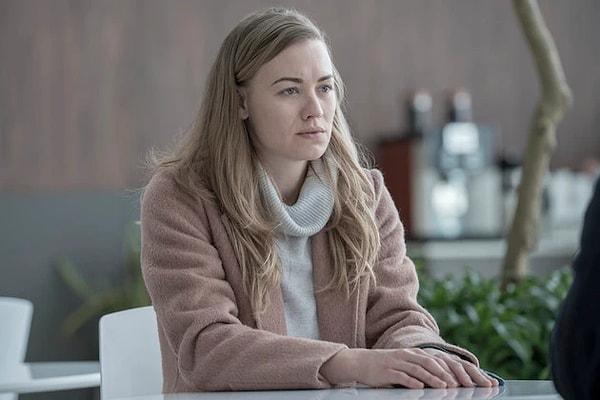
Courtesy of Hulu
She still wasn't the old Serena. Faye Dunaway was famous for treating a wire hanger like a sign of the apocalypse. When June arrived in the Waterford home, Strahovski looked like a literal bomb could go off in her face, and she'd just roll her eyes and take another puff off of her cigarette. I wanted drama, not quiet fury. Her words should've burned like they did in the film. Instead, I was more focused on Lydia whacking desks with her cattle prod and gouging Janine's eye out. I didn't feel that either, not the way I was supposed to. It was disappointing. I was bound to absorb every tiny detail of the series; It was 'The Handmaid's Tale.' How could I not watch? But I didn't want it to be a draining experience. I wanted to love it more than the book and movie combined.
Finally, near the end of the episode, June had just gotten back from shopping. She witnessed Fred shutting Serena out of his office, and Serena was not happy. She caught June watching from the hall and told her to go back to her room. She didn't have to yell or scream. That one bitter command had more venom than Faye Dunaway had in her entire body, and the look they shared spoke volumes--not just about the way Serena treated June--which reminded me of an abusive mother--but also about Serena's struggle, what she was going through, and how dark her story would be. That was a tantalizing thought.
Gilead had been established as this dark wave of dread that had settled across the nation, creating a new normal. Some people saw it, and some people were too blind to accept that it was there. But Serena was a woman. She was drowning, caught in a world where her rights, her autonomy--everything that made her an equal human being, had been taken away. Imagine being forced to accept that. I couldn't stop watching if I tried.
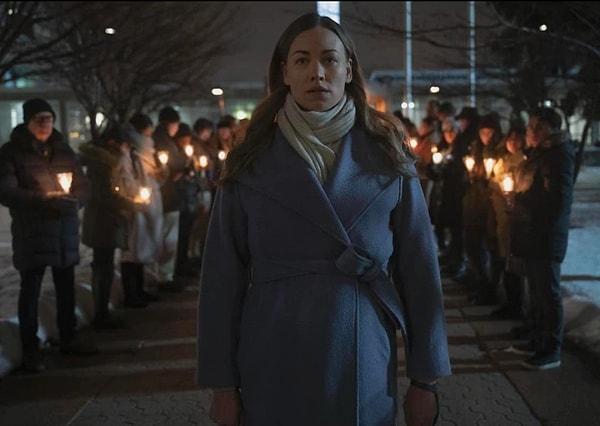
Courtesy of Hulu
The Big Mistake
One of the series' ugliest moments was a seemingly lighthearted flashback from the time before. Fred was tired after a hard meeting with the Sons of Jacob. He had just gotten home, and Serena was there ready to listen and be supportive. She suggested that they go out for a movie, and she wouldn't take no for an answer. When they took their seats, Fred pulled out his phone and informed Serena that he'd just received a message saying that they were going to slaughter congress just like 'we' proposed--meaning Serena must've had a hand in helping him plan things. He was upset about it. He looked around the crowded theater and lamented all of the suffering they were about to cause. Serena said that people were already suffering. She knew that there would be a holocaust. The disabled and elderly would be rounded up and killed. The population would be thinned, and many of the nation's women would be enslaved, and she didn't care. She was more focused on her ideological standpoint.
She didn't seem to think that her rhetoric or the fall of the United States would affect her at all. That's why when Offred was introduced to her in the novel, she was considered a fallen woman--a term that has been used to describe her many times. She was completely shattered when her rights were taken away. She didn't expect it.
Serena thought she could be the woman behind the man. She was smarter than Fred and more confident. Quite often, he depended on her, and he encouraged her in all of her endeavors. When Gilead took hold, she continued to help. She'd assist with his paperwork, advise him, and even sign his name. She'd talk about his leadership responsibilities and strategy using the term 'we' as if she held an equal role in his position. Soon things started to change. He would keep her out of his office and refuse to talk business with her, and eventually, she was relegated to the role of housewife. It struck her down. Her world became smaller. She couldn't read or write. She couldn't hold speaking engagements. Most of her time was spent harassing the slaves, knitting, and pruning. She wasn't allowed to do much else.

Courtesy of Hulu
Serena's career wasn't the only thing she lost. In the fourth episode of the first season, Fred had trouble performing the ceremony. He tried to play it off and get things working, and it just wasn't happening. He snapped his suspenders back into place and left the room. Serena followed behind him, asking to help. He seemed wary, but she looked like she'd been in the desert and she'd just found an oasis. Just allowing her head to rest against his--it was obvious that she needed his touch. She lowered herself to her knees, and he pushed her away and walked out, leaving her there looking like she was going to burst into tears.
Wives with handmaids or adopted children are not allowed to have sex, which means they're often robbed of intimacy. Some women might find it relieving, not being forced to have their sweaty husband climb on top of them every night, but a life sentence? It's unbearable and wrong. Serena had to live with him coming home late at night, spending his time at Jezebels, and fawning over the handmaids, playing Scrabble with them, and confiding in them. Later on in that episode we find out that Fred needs to feel connected to women to have sex, which meant that he was making an effort to be close to everyone except Serena. It must've been the ultimate slap in the face.
She was robbed of power, freedom, intimacy, and human kindness. She had nobody. That was what it meant to be a wife in Gilead. Serena had long represented their struggle, but when we saw it in the book or the film, we could hate her, laugh at her, and think of her as a monster. It would still work because we weren't following along on her journey. We were just getting a short glimpse of her life. But the series wanted to dive deep, examine every aspect of what she was going through, and show us what it meant to find out that you're a member of a discriminated class. How were they supposed to do that with us laughing at her and enjoying her suffering? Would that be right--for us to hate a symbol of oppressed femininity? Would that be in time with the overall theme? If they wanted to portray Serena's arc--the story of women across Gilead--they were going to have to make us care about her just a little bit. That turned out to be a messy process, but it was one that the writers understood.
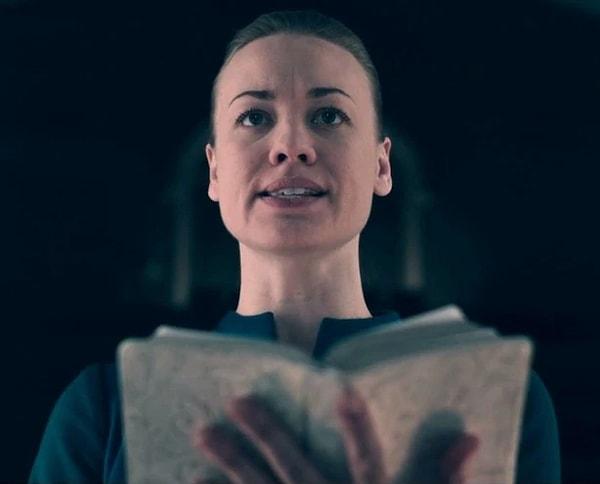
Courtesy of Hulu
Heresy
When June was first ushered into Serena's parlor, she had been instructed how to stand, how to speak, and where to look. She wasn't even allowed to look at Fred when he entered the room. That was the way handmaids were supposed to compose themselves in Gilead. The reigns were kept so tight that even flinching or saying the wrong thing could mean punishment. Viewers would say that it was too much. They needed breathing room just like June did. It was too cruel, too horrific. Everyone was smothered by what they saw, and it seemed like the show was just tightening its grip.
Serena became the symbol of decorum. She never faltered. She always enforced the rules, and she rarely said a kind word. It was like dealing with a parent who never told their children 'I love you.' Every time she did throw June a bone, it was like taking in a breath of air after nearly drowning underwater.
We were allowed a little bit of relief in season two. Serena would take June for walks. She let June sleep in the living room instead of in her own room, and there were some kind moments between them. She showed June the nursery, and they would gossip about the other women in the neighborhood. It was tense, but seeing Serena make an effort made us want her to succeed at becoming a better person. When Fred was forced into the hospital after the new red center was bombed, she let June work with her and edit her writing as she performed Fred's duties. The two actually worked well together, complimenting one another on their skill. When baby Angela went into the hospital, Serena did something unprecedented, showing that she valued June's opinion. She asked her advice about whether or not they should allow a martha--who had been a prolific pediatrician--examine the child. She had been so cold and so hateful before, and the audience could only put up with that for so long. We needed relief, and she was giving it to us.
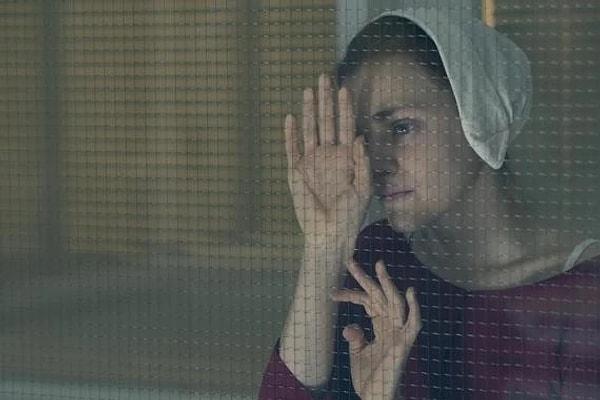
Courtesy of Hulu
Imagine you're locked up in a cell. You're starving to death, and you can't get out. You'd pace around, thinking about how you're going to die. You'd heave until you saw spots, and weakness would come on. That would be the first sign. Dread would come over you. You'd start to have trouble walking. There would be a maddening desperation, so horrifying it would consume you. It would get so bad that you would try to eating your fingernails and hair. You'd scrape away at the concrete, trying to grab up bits of dust or granules of dirt--anything to take away the emptiness in your stomach. Eventually, the weakness would be so bad that you'd just sit in the corner and wait to die. Then the person that locked you up comes to your cell door. They give you a kind smile, and they pass you a small bowl of gruel. There would be burst of gratitude and relief. Maybe they spend a second talking to you, making you feel appreciated, and they promise never to let you starve again.
When a person has been humbled like that, their mind is more pliable. They're impressionable and easily convinced. Simple interactions between a captor and a prisoner can turn into an attachment and eventually a sense of loyalty and affection. Every time that Serena was kind to June, June was like that starving prisoner being handed a bowl of gruel. She started to bond with Serena, and Serena was just sick enough to reciprocate. There were times when we'd hear statements that seemed to equalize the relationship between them. June was a good editor. Serena was a good writer. They liked the same restaurant in the time before. Maybe they ate there at the same time. When Serena came to June asking for advice about the pediatrician turned martha, it felt like they were friends, not slave and master. Serena even agreed to ask the Putnams to allow Janine to see the child, and she fought for the child's life, confronting the martha when she said there was nothing that could be done. We saw good in her. We knew that it was there, and we couldn't deny it.
Things had changed. It had been well over a year since the horrors of the first season. They weren't as sharp as they had once been, and we were learning about Serena--how she cared for her cause, and how devoted she was to building a good life for her daughter. We could believe those things were true, and we knew that she had good intentions. It was almost possible to forgive her and see things her way, at least from a detached perspective. She was a fallen woman with nothing to live for, so she'd do anything for a child. Her husband was having sex with June and coming home from Jezebels every night. It made sense for her to be cruel. She was human, after all.
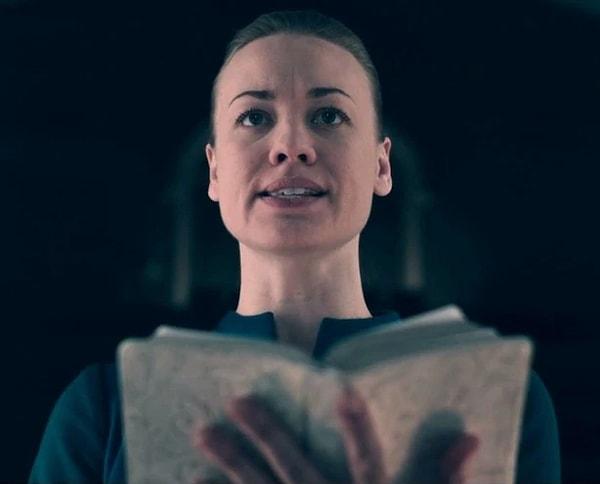
Courtesy of Hulu
There were moments when she'd remind us of who she was, but things were decidedly complicated. After she bonded with June and signed the Commander's name to authorize the pediatrician's temporary transfer to the hospital, Fred came home and called June and Serena into his office. He essentially declared that Serena's time helping him was over. That wasn't her place. It must've been a huge rejection for her. She enjoyed working, and she seemed threatened and disturbed by the idea that she would have to live in a world where that wasn't possible.
What happened next seemed difficult for her to compute. Fred called her over and had her lean against the desk so he could beat her. She gave in and let it happen like some obedient child, proving that she was brainwashed, which added a level of vulnerability and weakness to her character. It was hard not to sympathize as June watched it happen. It was even harder when she went back to her room and we saw her bruises on her back. This was meant to be her redemption arc. It was the moment when she realized the true nature of the theocratic beast she had helped build. She just had to let June in, accept what was happening, and try to do something--anything: leave, help June escape, or give Nichole up. Instead, when June came to talk to her, she stifled her sobs, told herself to be strong, and commanded June to go back to her room.
When these types of things happened to Serena, we had to wrestle with the fact that it was happening all over the country. Millions of wives were being cheated on, beaten, and forced to give up their rights, and it was wrong--any human rights atrocity is wrong--regardless of whether they supported the regime or not. In fact, nobody can be blamed for giving in to brainwashing or rhetoric. That's not something that people can just resist. We all swear up and down that we'd fight it tooth and nail. We'd see the lies, but entire nations have succumbed to this force, and they weren't half as convincing as Gilead. Differences in belief are not as simple as good and evil, or strength and weakness--or even intelligence and stupidity. People do get caught up. Sometimes the smartest of us are the first to give in, and if it came down to it many of us would have crumbled. The deck was stacked against Serena. She was brought up in a strong, Christian household by a deeply misogynistic mother--a woman who was a thousand times crueler than she ever could have been. Children who grow up like that tend to accept the moral code they're raised around, especially if they spend their childhood trying to garnish love and approval from their parents, which seemed to be the case when Serena visited her mother in season three.

Courtesy of Hulu
There was a point when I myself felt like Serena needed to change. I wanted to see her happy, healthy, and fully liberated. I have always been the type of person who can look past an individuals mistakes and flaws and see the outside forces that forged them into the person they've become. I didn't love her, especially not after she had June violated near the end of her pregnancy, but I wanted her eyes to open so she could see the flaws in her thinking. I also recognized how Serena's enlightenment could help June.
This did happen in the season two finale. Nick's new wife Eden was Gilead's golden child. But she was human as well. She fell in love with an equally pious guardian and ran away with him. When her parents found out, they turned her in and she was executed for refusing to recant her love. Afterward, June found a Bible in her things. Infuriated, she brought it to Serena to confront her. She needed Serena to know that Nichole would never be safe in a country that would execute someone like Eden. Serena played dumb, but she knew the truth. That girl was faithful, and that Bible was proof of it.
She took Eden's Bible, hid it away, and went to go speak with Mrs. Putnam. The other wives were members of a discriminated class. They too were robbed of intimacy, power, and meaning, and they weren't happy about it--none of them were. They all agreed that things needed to change. Serena rallied them to go to the council and speak to the commanders to lobby for the right to literacy. When the commanders laughed at her, Serena pulled out Eden's Bible and started reading from it. It was almost inspiring, but it was extremely naive. Up until that point, Serena never fully understood the nature of Gilead. She didn't think they would actually hurt her. But they did. Her own husband betrayed her and allowed them to cut her finger off.
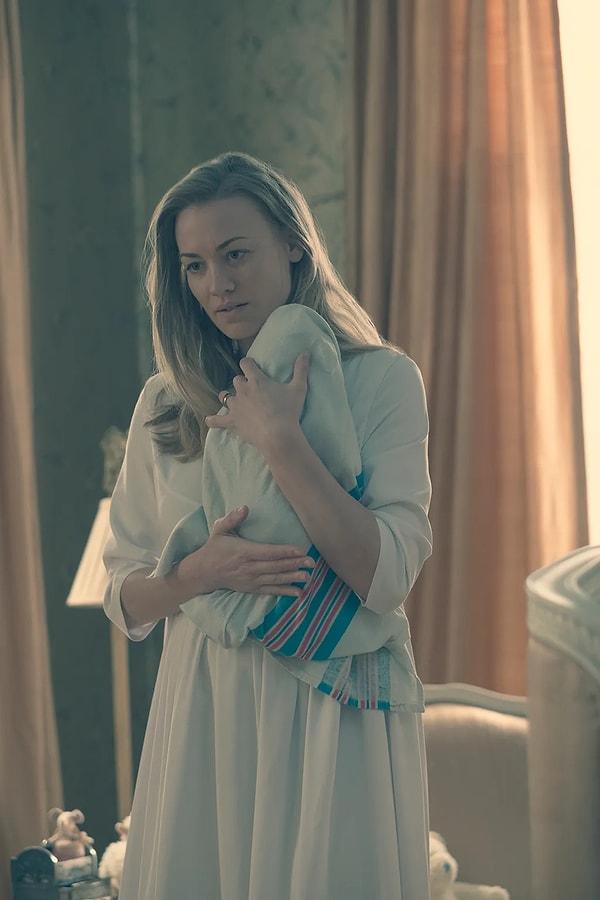
Courtesy of Hulu
When Serena was brought home, she was in complete shock, like Janine when her eye was gouged out. She was forced to see Gilead for what it was, and that wasn't easy for her. She had spent years travelling the country, touting her own personal brand of 'domestic feminism.' It was her life's work, her passion. Whenever it came up, it was like she was talking about her firstborn son. Her writings were used as the basis for Gilead's philosophy. She was the founding mother of the nation in many ways, and now she was seeing the actual results of her work, the dread force that was Gilead, something that she'd never allowed to see before. She did let June in this time. She agreed to have June sit with her and comfort her. June has always represented decency and logic in the show. She's the symbolic light of knowledge, so when she walked into Serena's room, it was a sign that Serena finally saw the truth. She wasn't in a utopic dream. She had helped build a totalitarian theocracy.
When anyone faces a serious correction, regardless of who it is, there's going to be some level of sympathy involved. Her reaction, June's comfort, and the bond they had built combined to create a real moment of grief. She tried to do something good, and she faced the ultimate betrayal. It didn't matter what she had done; that was a harrowing moment, and people felt sorry for her.
Her redemption arc seemed complete when she caught June trying to sneak away with Nichole, and instead of turning them in, she let June leave. It went against everything we knew about Serena--her selfishness, her obsession with motherhood, and her conformity. She didn't seem capable of letting Nichole go, even after she lost her finger. But she was actually able to do the right thing. She also let June go, and that was significant. Much of the horror behind Gilead was based on June's captivity and Serena's refusal to compromise on the rules. Freeing her slave was the ultimate sign that she had switched sides and seen the light. It was an inspirational act, and it was hard to hate her at that point.

Courtesy of Hulu
Fool Me Once
I fell for Serena's honeytrap. In season three when she burned the Waterford house down, I cheered her on. I understood that there would be some lingering false beliefs and even cruelty, but I was ready to look past that. It was the ultimate moment of rebellion--way better than June's graffiti on her bedroom wall. She was sticking it to the patriarchy, and I fully believed that redemption arc would continue. It didn't seem possible for Serena to go back to the way she was.
At that point in the show, there was strong divide between good people and bad people. Good people hated Gilead. Bad people believed in Gilead. So Serena still fell closer to the good side. She left Fred, and she went to stay with her mother, Pamela.
Pamela wore her personality on her sleeve. It was obvious that she didn't like emotion or any sign of weakness, and she wasn't going to put up with it, even after her daughter's husband beat her and cheated on her. She said it wasn't important, because Serena had no place in this world without him. It was easy to see why Serena would act out as often as she did. She was trying to be seen and heard, so she developed a habit of throwing tantrums. Her mother was so suffocating that she'd have to do something to assert herself. Part of her also tried to repress her emotion, just like her mother taught her. This would cause things to build up and build up, until she was attacking her slaves and raging at her husband. This was more than just a case of brainwashing. Serena had a complex, and it wasn't the kind a person could just move past. It would be tied with her mood, her hormones, her behavioral patterns, and her biochemicals. She probably couldn't control herself, not without help.

Courtesy of Hulu
Serena sees the world through a narcissistic lens, based on her own selfish needs and perceptions. She's judgmental. She gossips and makes fun of others. She's driven by hatred and rage, and beneath all of that--June has said--there's nothing, but pure misery. She'll do anything to avoid having to feel that way, so she moves from one comfort to the next--her abusive husband and Nichole--hoping to cure the pain inside of her, but it never works.
That's why she couldn't stop herself from launching the campaign to have her sent back from Canada. Enlightenment wouldn't have been enough to fix her. Nothing would. She was rotten from the inside, an addict struggling to self-medicate in whatever way possible.
When Serena does something evil, she goes big. She burns the world to the ground and deludes herself into thinking it's OK. She recruited Fred to have handmaids gather at the capital. They sent out international broadcasts, images of slaves with their lips piereced to keep them silent, led in prayer by June. She even berated June in front of a desecrated Linclon Memorial, proving just how far she had regressed.
It was hard not to hold out hope at first. Serena showed up at the Lawrence house after he took June in as his handmaid, asking June for advice. She was obsessed with Nichole, but she wanted to do the right thing and let her go so she could have a better life. In the end, Serena couldn't do it. It was like a junkie trying to put down the needle--and in a very real sense; Serena does self-medicate in this way. The hope of a child was what she clung to during the darkest moments in her life.
The whole escapade in DC was a massive betrayal, both for June and the audience. Was Serena did was flamboyant--massive, just in sheer numbers. The show bragged about the scale of the scenes at the capitol, and we had been led on by her. Some people felt sorry for her, but this is what the show does. Warren Littlefield, the executive producer spoke about it. He doesn't want us to bask in someone else's pain. He saw it as immoral, just like it would've been immoral for us to laugh at the symbol of wifehood in Gilead.
Fred's death was another example of this. They didn't want us to feel like June was the good guy defeating the bad guy. They made him beg. They showed his humanity, and they went to great pains to show us that a sacred human life was being snuffed out. They showed us that meant--the guilt, the trauma, and the need for justice. They're giving the Waterfords what they deserve, but they're twisting it. It's almost hard to catch, because they're so good at what they do. We simply take on the impression the show's creators want to give us, regardless of everything the Waterfords have done.
Don't Be Fooled
I was caught off-guard with Serena. I loved her in my own platonic way. I cared about seeing her succeed. I wanted her to run off with Tuello, go have treason and coconuts--write a tell-all about Fred, and be free. She was charming, and she was an extraordinary person. She was intelligent and beautiful. She was able to set herself up as a successful author, a pundit, and major political figure. Most people have trouble getting up and going to work every morning, but she excelled at life. There was something endearing about that. She also seemed peaceful and kind at times. There seemed to be a brightness within her, and it shone through.
That brightness was a facade. It was like the peaceful expression on a junkie's face after they shoot up heroin. It was a sign that Serena was doing something--anything she could to keep her misery at bay, like the addict she was.
I was fooled by Fred too. It make me sick to my stomach listening to his banter while Nick dragged into the woods to be killed. I kept thinking about what it would be like if I was in that situation. When June dipped down to bite his ear off, I couldn't get past the actual act. I thought she was a monster. What I should've been thinking about was the fact that Fred invented salvagings. He helped kick off a holocaust. He was the architiect behind the so-called window dressing in Gilead. He was a marketing executive who came up for the branding of the nation, and he was there when the idea for handmaids was proposed. He was also addicted to violating women, and had he not been killed, he would've hurt someone else just like he hurt June and Moira.
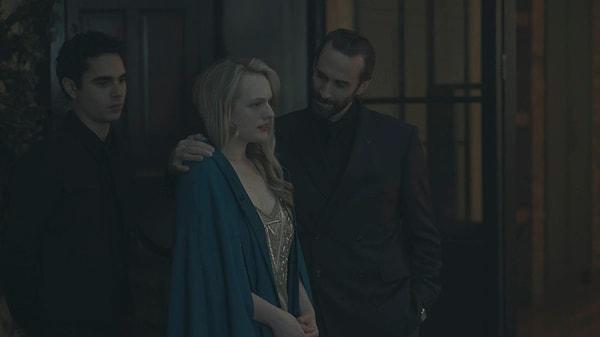
Courtesy of Hulu
I will not be fooled again by Serena. They did the same thing when she had her baby in the barn--they twisted things around, using their old bond, June's compassion, and Serena's moment of vulnerability to make us sympathize with her her. But I'm not about to forget how they ended up there.
When Serena found out that June had been picked up by Mr. Wheeler's militia in No Man's Land, she asked to go, because she really did want to see June die. The day that episode aired, the showrunner Bruce Miller did an interview talking about how he didn't believe in having his characters think ahead. He said that Serena shot Ezra, the guard that was keeping her at the Wheeler's house, on a whim. So that wasn't some elaborately hatched escape plan to get away from the Wheelers. That was Serena's small-minded selfishness leading her to the point where she couldn't live without seeing her husband's killer murdered.
When she offered her child up to June, that wasn't a moment of clarity. She knows the difference between right and wrong, and she is capable of making good decisions, but her emotions get in the the way. She would've regretted it the second June started to walk back to the car. She's still the woman that bashed June's head against a doorframe for letting Fred violate her at Jezebels. She's the epic villain that berated her slave in front of the Lincoln Memorial. She's the woman that told Luke--who was desperate to see his daughter--that 'Agnes' was happy. She is a sadist. She is a monster, and she is sick. So don't shed a single tear for her. She deserves to be turned into a handmaid. She deserves to be handcuffed to a bed. If anyone feels otherwise, it's because she's a consummate actress.
Keşfet ile ziyaret ettiğin tüm kategorileri tek akışta gör!

Send Comment
So you're saying the fact that I believe that EVERYONE deserves to have their human rights respected is because Yvonne Strahovski is a great actress? Becaus... See More